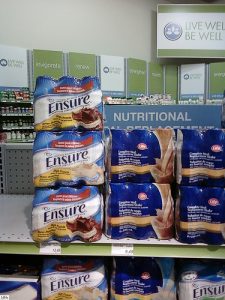Pros And Cautions Of Liquid Nutritional Supplements
 Supplemental nutrition drinks are meant to provide a healthy balance of fats, proteins and carbohydrates. They can be very helpful for individuals who have problems chewing food, are recovering from an illness or surgery, or those who have a loss of appetite.
Supplemental nutrition drinks are meant to provide a healthy balance of fats, proteins and carbohydrates. They can be very helpful for individuals who have problems chewing food, are recovering from an illness or surgery, or those who have a loss of appetite.
If you are working with a doctor or nutritionist on recovering from an eating disorder, always consult with them before adding any nutritional supplement to your diet.
Two types of nutritional supplements
There are two general categories of nutritional supplements. Formulas are designed to be used under a doctor’s supervision. They are created to address specific diseases such as chronic obstructive pulmonary disease, or cancer. Although they are sometimes taken orally, formulas are frequently delivered via feeding tubes.
Supplemental shakes, such as Ensure or Boost, are made for oral consumption and designed to help individuals meet general nutrition or caloric requirements. Some are created to meet the needs of people with specific health conditions. Glucerna, for instance, will not spike the blood glucose of those with diabetes. Shakes are fortified with essential nutrients and usually contain plenty of sugar so they taste good.
Although shakes are available in grocery stores and do not require a doctor’s OK, it is wise to check with your physician before using them, especially if you are taking any medications. Certain vitamins can interfere with the effectiveness of some drugs.
Supplement cautions
Consuming extra vitamins and minerals is not always better for us. “If you use the drinks as meal substitutes, that might be okay. It’s not okay to eat a full meal and then drink a supplement, unless the goal is to gain weight or stop weight loss,” says Dr. Suzanne Salamon, a Harvard Medical School instructor. Consuming a supplemental drink on top of a meal is too many calories for most of us.
Another concern about nutrition supplements is the amount of sugar they contain. Some contain more sugar than any other ingredient. However, substituting one meal a day with a nutritional shake is acceptable if an individual needs the calories and has difficulty eating food, according to dietitian Stacy Nelson, Massachusetts General Hospital.
Maybe the main caution about supplemental drinks is that they can never replace the nutrition derived from eating whole foods. “Even if they’re fortified, they still won’t contain all the nutrients a whole food source would,” said Nelson.
Read the label
The best liquid supplements will list fruit or types of protein (such as milk) as the first ingredients on the label. If the first or second item is sugar, consider looking for a better option. A meal-replacement supplement should give you about 400 calories per serving. Look for not more than 6 grams of fat, not more than 40 grams of carbohydrates (including sugar) and a good shake will have 10 to 20 grams of protein.
Alternatives
In the refrigerated part of your grocery store, you will find food-based smoothies that are possibly healthier options. They are usually less processed, contain fewer added sugars, and are not over-loaded with vitamins, herbs, or minerals. Examples are Odwalla Super Protein, and Bolthouse Farms Protein Plus. They likely will cost more than canned nutritional shakes, but are worth the extra pennies if they are better for you.
Source: Harvard Health
 Eating Disorder Self Test. Take the EAT-26 self test to see if you might have eating disorder symptoms that might require professional evaluation. All answers are confidential.
Eating Disorder Self Test. Take the EAT-26 self test to see if you might have eating disorder symptoms that might require professional evaluation. All answers are confidential.